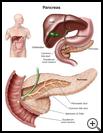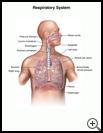
Cystic Fibrosis
________________________________________________________________________
KEY POINTS
- Cystic fibrosis is a disease that causes the body to make thick, sticky mucus. The thick mucus blocks airways, damages the lungs, and makes it hard to breathe.
- It is important to prevent infections by washing your hands often and getting recommended vaccines, such as flu and pneumococcal shots.
- Treatment may include diet, exercise, medicines, and learning ways to clear the airways.
________________________________________________________________________
What is cystic fibrosis?
Cystic fibrosis (CF) is a disease that causes the body to make thick, sticky mucus. The thick mucus blocks airways, damages the lungs, and makes it hard to breathe. It can also lead to lung and sinus infections.
The thick mucus can also block the tube that connects the pancreas to the intestines. The pancreas makes digestive juices that help digest food. When this tube is blocked, it’s harder for you to digest food.
CF can affect all races and ethnic groups, but it is seen mostly in white people with northern European ancestors.
There is no cure for CF. It is a life-long disease that gets worse over time. Many people with CF live into their mid 30s. Children born after 2000 may live longer because of better ways to manage CF.
What is the cause?
CF is inherited, which means that it is passed from parents to children through their genes. Genes are inside each cell of your body. They contain the information that tells your body how to develop and work. When you have CF, the genes you inherited cause the body to make thick mucus.
To have CF, a child must inherit 1 CF gene from each parent. If a child gets a CF gene from just one parent, he or she is a carrier but does not have CF. If both parents have the CF gene, each child has a 25% chance of having CF.
What are the symptoms?
CF affects people in different ways. Most of the time, children start having symptoms soon after birth. Some people do not have symptoms until after age 18. Adult symptoms may include:
- Frequent coughing that brings up thick mucus
- Frequent chest and sinus infections
- Foul-smelling, greasy bowel movements
- Stomach pain and gas
- Skin that may taste salty even when you are not sweating
- Inability to gain weight
- Not being able to father a child or get pregnant
How is it diagnosed?
Your healthcare provider will ask about your symptoms and medical history and examine you. You will have a chloride sweat test. People with CF have more salt in their sweat. To do the sweat test, a small wire is put on your skin. A weak electrical current causes the area to sweat. The sweat is collected and tested in a lab. This test does not hurt.
How is it treated?
The goal of treatment is to slow down the progress of the disease and help you lead as normal a life as possible. Treatment for CF includes:
Medicines
- Antibiotics to help prevent lung infections
- Anti-inflammatory medicine, like ibuprofen, to help reduce swelling in the lungs. Nonsteroidal anti-inflammatory medicines, or NSAIDs, such as ibuprofen, may cause stomach bleeding and other problems. Read the label and take as directed. Unless recommended by your healthcare provider, you should not take these medicines for more than 10 days.
- Bronchodilators, which are drugs that open the airways
- Medicine that helps you have thinner mucus
- Pancreatic enzymes, which help you digest food
- Special vitamins
Diet and Exercise
You may need to eat more calories to keep a healthy weight, have energy, and fight infections. You may need to add fat and protein to your diet. When you have CF, you use a lot of energy for breathing. Your body is also less able to absorb nutrients from food. A dietitian who works with CF can help you plan your meals.
If you are not able to get enough calories through meals, your provider may recommend a feeding tube and formula to give you extra calories.
Exercise according to your healthcare provider’s recommendations. Exercise can help loosen mucus and make your heart and lungs stronger.
Airway clearance
You will learn ways to clear your airways. You can do some things yourself and some require special equipment or a trained person to help you. They include:
- Chest physical therapy (CPT). This involves firm pounding on different parts of your chest and back to help move the mucus out of your lungs so that you can cough it up. You will need help from a trained person or a family member for CPT.
- Deep coughing. This is a deep, controlled cough. A deep cough is less tiring and more effective in clearing mucus out of the lungs than a “regular” cough.
- Self drainage or autogenic drainage (AD). This involves breathing 3 different ways to move mucus out of your lungs. Learning to do it takes training and practice.
How can I take care of myself?
Follow the full course of treatment prescribed by your healthcare provider. In addition:
- Don’t smoke. Avoid exposure to tobacco smoke, polluted air, dust, fumes, chemicals, and mold.
- Make sure you drink plenty of fluids. This will help loosen mucus. If you’re sweating a lot during hot weather or activity, drinking a sports drink can provide both fluids and salt.
- Eat high-calorie snacks between meals if you are underweight. Ask your healthcare provider about drinking nutrition supplements. Take vitamin and mineral supplements if recommended by your provider.
- To help prevent infections:
- Wash your hands often.
- Make sure that you are up to date with the recommended vaccines, such as flu and pneumococcal shots.
- Don't share items like drinking glasses, eating utensils, or toothbrushes with others.
- Do the breathing exercises recommended by your provider. They can help strengthen the muscles used for breathing. You may need a physical therapist or respiratory therapist to help you learn to do them properly.
- Get tested as often as your healthcare provider recommends to see how well your lungs and liver are working and to check for infections or diabetes. People with CF have a higher risk of diabetes.
- Ask your healthcare provider:
- How and when you will get your test results
- If there are activities you should avoid and when you can return to your normal activities
- How to take care of yourself at home
- What symptoms or problems you should watch for and what to do if you have them
Make sure you know when you should come back for a checkup. Keep all appointments for provider visits or tests.
- You can get more information about CF from:
- The Cystic Fibrosis Foundation
800-344-4823
https://www.cff.org - The National Heart, Lung, and Blood Institute
301-251-1222
http://www.nhlbi.nih.gov/health/health-topics/topics/cf/
- The Cystic Fibrosis Foundation


